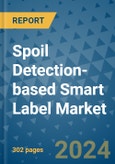Key Drivers of Market Growth
Growing Adoption of Smart Packaging:
The increasing demand for hygienic food materials, particularly in sectors like vegetables, fruits, meats, and fish, is propelling the adoption of spoil detection-based smart labels. Consumers' preference for safe and hygienic food products, coupled with the rise in smart packaging solutions, is fueling market growth.Regulatory Compliance and Food Safety Measures:
Strict regulations in developed nations to minimize food wastage are fostering the demand for spoil detection-based smart labels. These labels aid in effective tracking of food spoilage, ensuring compliance with food safety standards and regulations.Consumer Awareness and Ethical Concerns:
With consumers showing heightened interest in the ethical aspects and health benefits of food and beverages, smart labels play a crucial role in providing transparent information about product origin, production processes, and freshness. This enhanced visibility empowers consumers to make informed choices, thereby driving market growth.Country-wise Market Insights
United States:
In the United States, there's a high demand for spoil detection-based smart labels due to several factors. Firstly, the country faces a significant food waste issue, with estimates indicating that it accounts for a considerable portion of the annual food supply, leading to food insecurity for millions. To combat this problem, measures are being taken to prevent food spoilage, thus driving the market growth for smart labels. Additionally, the presence of retail giants like Walmart spearheads the adoption of smart labels, contributing significantly to market expansion. Moreover, innovative spoil detection-based smart labels are being introduced by vendors to minimize food wastage in retail outlets. The adoption of RFID technology further fuels market growth, especially in the healthcare and medical industries, where rising healthcare costs create opportunities for smart label deployment.China:
In China, the spoil detection-based smart labels market is witnessing significant growth driven by urbanization, increasing consumer income levels, and a growing demand for packaged goods. Retail and Food and Beverage Applications are expected to contribute substantially to market growth in the region, providing consumers with confidence in the freshness of poultry and meat products they purchase. Logistics labeling is also expanding significantly in China's industrial supply chain, indicating high consumption of labeling materials.Europe:
In Europe, particularly in the United Kingdom, the market for spoil detection-based smart labels is being driven by initiatives to address food waste, strong presence in e-commerce, and government efforts to promote packaging trends that reduce waste. Germany's government initiatives, in alignment with European Commission goals, aim to reduce food waste throughout the supply chain, which is expected to drive the deployment of smart labels with spoil detection capabilities, contributing to market expansion.Category-wise Insights
Fish Segment:
The fish segment emerges as the market leader, poised to grow at a substantial CAGR of 11.8% during the forecast period. Intelligent food packaging incorporating smart labels plays a pivotal role in enhancing the preservation of fish products by continuously monitoring their quality across the supply chain, thereby reducing food-borne illnesses and waste. The integration of RFID and NFC technologies enables efficient tracking and tracing of packaged food items, while temperature- and color-sensitive labels serve as indicators of freshness and shelf life.Enterprises like Seafood IQ and FishPeople harness the power of smart labels to offer freshness ratings, traceability, and compelling product narratives to consumers. Heightened concerns surrounding food safety contribute significantly to the food and beverage industry's substantial market share, facilitating effective supply chain planning for warehouse and inventory managers.
Time-Temperature Indicator Segment:
The time-temperature indicator segment currently holds the top position in the spoil detection-based smart label market and is poised to maintain its dominance throughout the forecast period. Projections suggest a substantial CAGR of 11.9% for this segment.Smart labels equipped with time-temperature indicators offer critical insights to end-users regarding the shelf life of products, including food, beverages, and medical drugs. These indicators undergo color changes when breached, facilitating improved control within the supply chain.
Given the susceptibility of perishable items and medical products to temperature fluctuations during transportation, assessing the risk of spoilage becomes paramount. Consequently, the adoption of time-temperature indicators has garnered significant traction across various industries, bolstering quality control standards and enabling the timely detection of spoilage.
Competitive Analysis:
The market for spoil detection-based smart labels is highly competitive, with prominent players such as SATO Holding AG, Zebra Technologies, Avery Dennison Corporation, and others investing significantly in expanding their manufacturing capabilities. These companies are at the forefront of innovation, developing advanced smart label solutions to cater to the growing demand across industries worldwide.Key Companies Profiled
- SATO Holding AG.
- Zebra Technologies
- Invengo Information Technologies Co. Ltd.
- Avery Dennison Corporation
- Muhlbauer Holdings AG & Co.
- Ensurge Micropower
- Evigence Sensors
- Insignia Technologies
- Innoscentia, CCL Industries Inc.
Spoil Detection-based Smart Label Market Outlook by Category
By type:
- Time temperature Indicator
- Oxygen Indicator
- Carbon dioxide Indicator
By Application:
- Fish
- Meat
- Vegetables
- Dairy Products
- Processed Foods
- Others
By Region:
- North America
- Latin America
- Europe
- Asia Pacific
- The Middle East and Africa
This product will be delivered within 1-3 business days.
Table of Contents
Companies Mentioned
- SATO Holding AG.
- Zebra Technologies
- Invengo Information Technologies Co. Ltd.
- Avery Dennison Corporation
- Muhlbauer Holdings AG & Co.
- Ensurge Micropower
- Evigence Sensors
- Insignia Technologies
- Innoscentia
- CCL Industries Inc.








